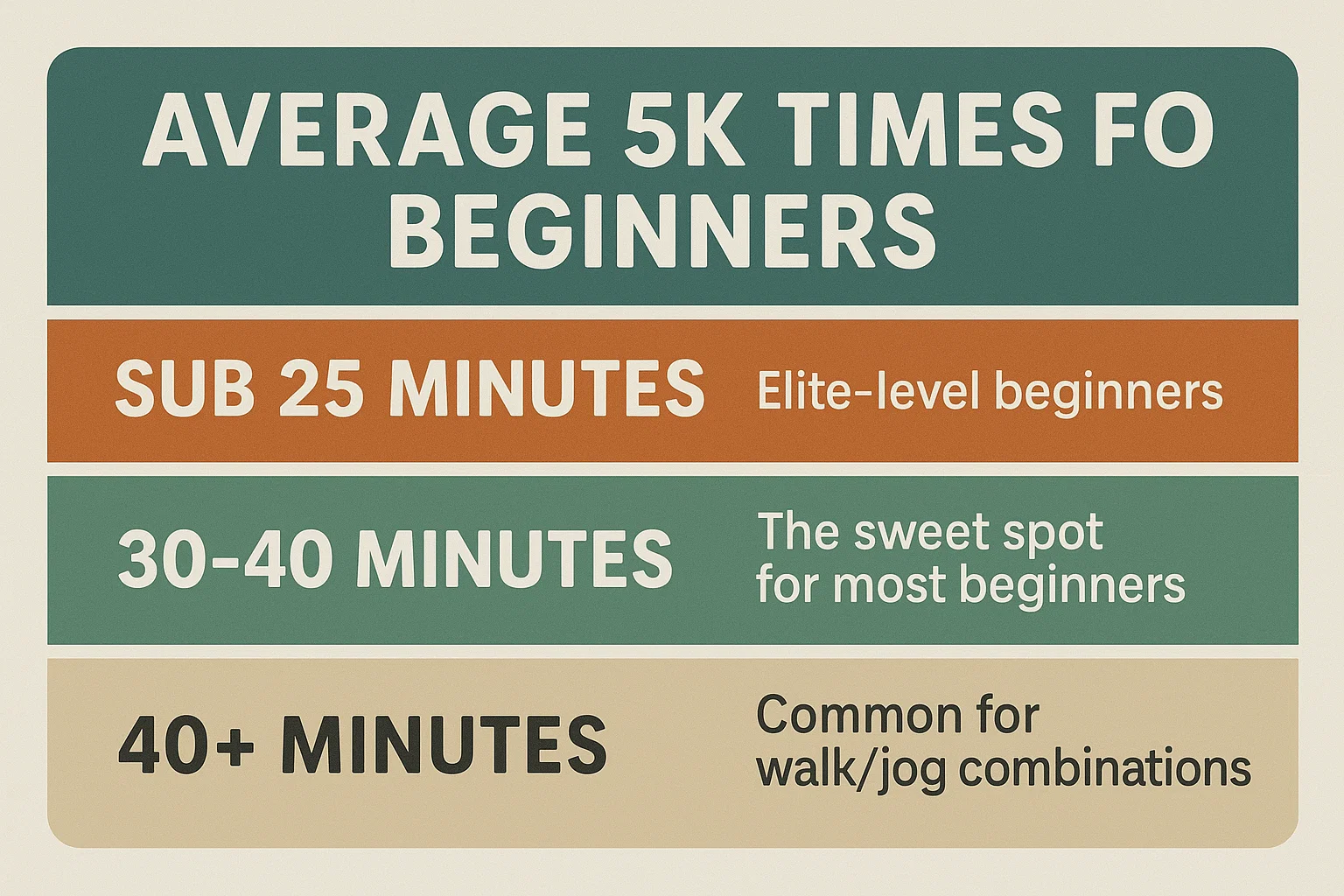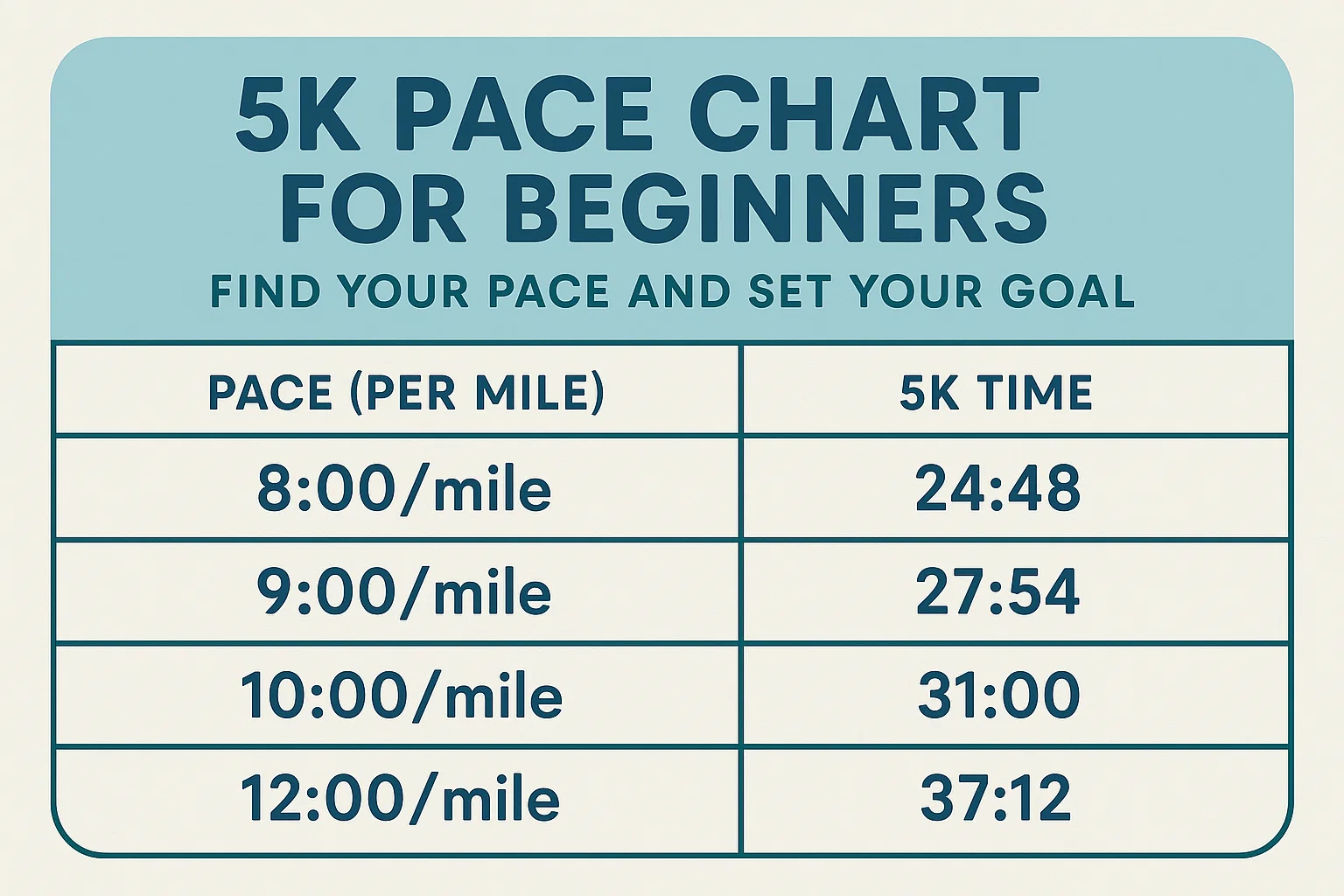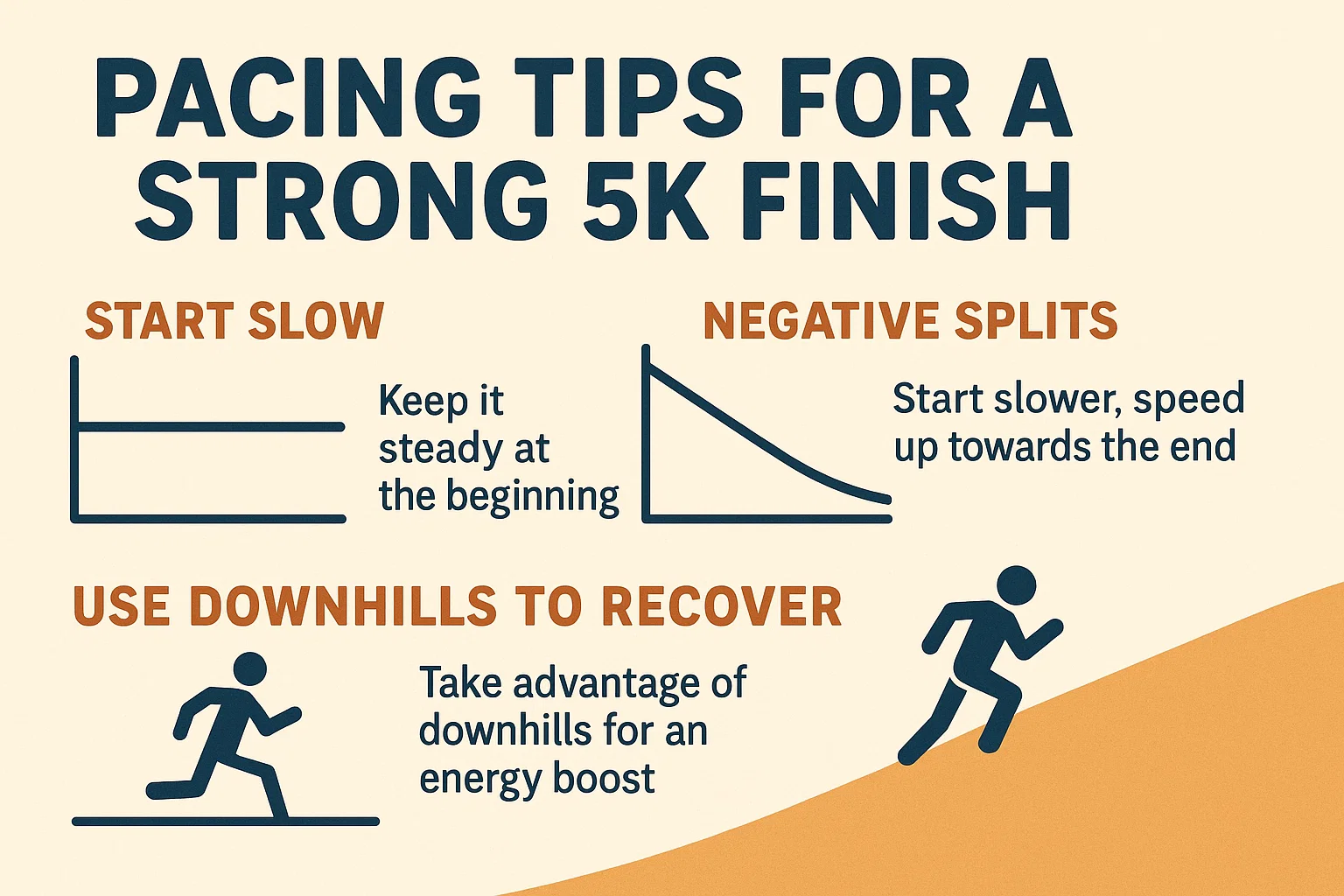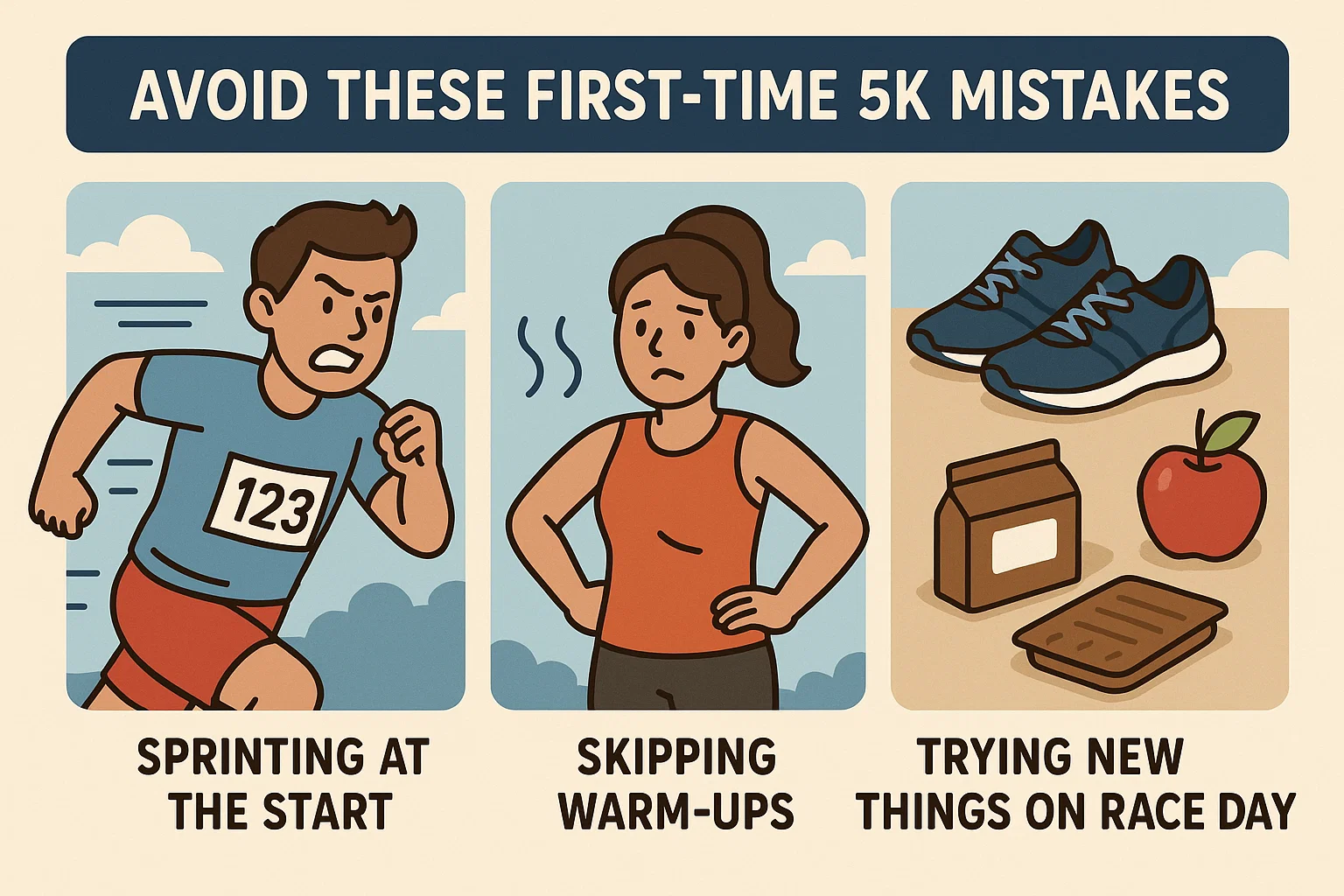Your first 5K is a huge milestone, and it’s totally normal to wonder, “How long should a beginner run a 5K in?”
As a running coach, I know everyone’s journey is different, but for most newbies, you’re looking at finishing between 30–40 minutes.
Don’t sweat it if you’re a bit slower at first – I’ve been there myself, and trust me, it gets better with time.
Most folks cross the line somewhere around 32 minutes for men and 39 for women in a typical 5K.
Fun fact: even Facebook’s Mark Zuckerberg ran a 20:35 5K, but that’s a way faster pace than most beginners (about 10 minutes faster, to be exact)!
Here’s the deal: if your first race feels like it’s taking a bit longer, that’s totally fine. Many beginners mix jogging and walking, so a time anywhere between 40-50 minutes is also totally normal.
Don’t stress about your time too much — and truth be told, for your your first 5K… showing up is a win, and finishing, without worrying about your time, is a bigger win.
Let me break down more 5K stats and numbers for beginners.
Understanding the 5K Distance
Before we talk about time goals, let’s break down what a 5K actually is.
It’s 3.1 miles. Sounds short, right? But believe me, when you’re out there racing, it feels a lot longer than it sounds.
It’s about 22.5 laps around a standard track or running back and forth on a football field about 50 times.
So, don’t underestimate it – treat each mile with respect and you’ll do great.
Average 5K Times for Beginners
Let’s look at what other runners typically do:
- Sub 25 minutes: This is pretty fast for a first-timer. If you’re running at an 8:00/mile pace, you’re going hard! Some elite fun-run groups might see this, but it’s not the norm for a first 5K.
- 30-40 minutes: This is the sweet spot for most beginners who’ve put in a bit of training. Hitting that 30-minute mark is a solid goal, and honestly, it’s what many Couch-to-5K programs target in about 8-10 weeks.
- 40+ minutes: This is totally fine too. I’ve had tons of runners who took it slow with walk breaks, and they finished around this time.
Remember: “Any pace is a good pace.” If you’re not at the sub-30 level yet, don’t sweat it — just train at your own pace and work up from there. Here’s what the data says: When new runners start out, the average pace is about 13:00/mile (that’s a 42-minute 5K for women and a 35-minute 5K for men). So if you finished your first race anywhere in the 30s–40s, you’re in great company.
5K Pace Chart for Beginners
Want to set a goal for your first 5K? A simple way is to figure out what pace you can comfortably maintain.
This chart below shows different paces and how they translate into your 5K time. Find a pace that feels good, and aim for the finish time that goes with it:
Let’s say you’re running at a 10:00/mile pace during training. If that feels comfortable, shooting for a 31-minute 5K is a solid, realistic first goal. Pro tip: The Mayo Clinic’s “Magic Mile” method is a great trick for predicting your 5K time. Run a hard mile, then add 1-2 minutes for your estimated 5K time.
Setting Your First 5K Time Goal
How do you choose a time goal for your first 5K?
Here’s the trick: find a goal that’s tough, but still doable.
You can try the Magic Mile method: run a mile as fast as you can, then add about 2 minutes to guess your 5K finish time.
Or you could check out local race results to see what other beginners (same age/sex as you) have done.
But listen, this is YOUR race.
Set a personal goal. If finishing without stopping is your goal, awesome. Go at your own pace, or even plan for a walk-jog strategy. If you’re shooting for a faster time — like breaking 35 or 30 minutes — that’s great too.
But don’t set a goal that’s too far out of reach. For example, if you haven’t trained at close to a 25:00 pace yet, don’t set that as your first goal.
Your First Race
For your first 5K, here’s my advice: forget the clock.
The main thing is to run or run-walk the whole distance. Endurance first, speed later.
Sure, if you already fit enough and can run the whole distance in one-go, be my guest. But I also know that many beginners are still… beginners. So aiming a little bit too high might be an overstretch.
So do what works for you.
I coached a runner who was obsessed with finishing his first 5K in under 25 minutes.
He went way too hard at the start, and by the last mile, he was walking — and not the fun kind of walk.
He was frustrated and pointed out to me – angrily – that my training plan wasn’t good enough. I simply reminded him that our goal was to finish within 30 minutes despite him being a gym regular for the past five years.
I also reminded them that lifting weights on a regular but only jumping on the treadmill every now and then helps a runner but doesn’t make one.
He was smart enough to recognize the error of his way.
When he came back for the next race, he focused on pacing and finished in 28 minutes. Not the sub-25 min he hoped for, but it was better than his first disastrous attempt.
The moral of the story? Patience and consistency are key.
Average 5K Times by Age Group: What’s the Deal?
You’re looking to run a 5K, right?
Here’s the thing: it all depends on a few factors, like how old you are and how much you’ve been running.
But let’s not stress too much – these numbers are just averages. The real magic comes from your training and your consistency. Here’s what the average 5K looks like across different age groups:
For Men:
- 20-29: 16:45
- 30-39: 17:41
- 40-49: 18:13
- 50-59: 19:31
For Women:
- 20-24: 36:22
- 30-34: 38:41
- 40-44: 38:26
- 50-54: 41:20
Your Pace and Finish Time
Your pace is key. Here’s a breakdown of what the numbers look like at different paces.
Don’t get too hung up on hitting these numbers right away—it’s all about working towards your goal.
- 5 min/mile – 15:32
- 6 min/mile – 18:38
- 7 min/mile – 21:45
- 8 min/mile – 24:51
- 9 min/mile – 27:58
- 10 min/mile – 31:04
If you’re just getting started, hitting a 9-minute mile is an awesome target. But with some training, you’ll notice those times starting to drop. That’s the fun part.
Age-Group Runners: Here’s the Real Scoop
We’re not all out there trying to chase down the pros.
And honestly? That’s perfectly fine.
A lot of us are just regular age-group runners doing our best. If you’re in this category, you’ll see a lot of differences in race times, and that’s because some people have trained more seriously or even ran in college. But regardless, it’s all about doing your best.
| Age Group | Men’s Average | Women’s Average |
| 0-15 | 34:43 | 37:55 |
| 16-19 | 29:39 | 37:39 |
| 20-24 | 29:27 | 36:22 |
| 25-29 | 31:09 | 36:16 |
| 30-34 | 31:27 | 38:41 |
| 35-39 | 33:44 | 37:21 |
| 40-44 | 32:26 | 38:26 |
| 45-49 | 33:13 | 39:19 |
| 50-54 | 34:30 | 41:20 |
| 55-59 | 37:33 | 45:18 |
| 60-64 | 40:33 | 45:49 |
| 65-99 | 42:59 | 50:13 |
You can see the trend here—times tend to get slower as people age, but there are always those who defy the odds and keep pushing. It’s all about consistency and sticking with it, no matter what age you are.
What’s a Good Time for a 40-Year-Old?
A lot of us don’t start running until later in life, so if you’re in your 40s, you might be wondering what’s a solid time for your age group.
For guys, hitting 18:13 in a 5K is pretty good.
For women, finishing somewhere in the mid-to-late 30-minute range is an excellent target.
But, here’s the most important part: don’t compare yourself to others. Focus on your personal growth. That’s what matters most. Every step forward is a win.
Quick Tips to Set Your Goal
Setting goals is important – but they need to be realistic. Here’s how I’d suggest you go about it:
- Do a Practice Run: Go out and run a few miles, then figure out what kind of pace you can comfortably sustain. This will help you set a solid 5K goal.
- Be Honest About Your Training: If your 5K training is mostly easy runs, setting a 25-minute goal might be a stretch. Set a more realistic goal like 30-40 minutes instead.
- Have Two Goals: Set one goal you know you can hit (like finishing in 40 minutes) and then shoot for a stretch goal (like 35 minutes). You’ll feel pumped even if you hit the first one!
Pacing Strategies for New Runners
This is where a lot of beginners go wrong: starting out way too fast and burning out. If you want to avoid that, here’s how to pace yourself:
- Start Slow: Trust me on this. Start with an easy pace – don’t rush. You’ve got 3.1 miles to cover, so save some energy for the finish.
- Find Your Rhythm: Once you hit your stride, keep it steady. Negative splits (starting slower and speeding up later) are always the best way to go.
- Use Downhills to Your Advantage: If you’re lucky enough to have some downhills, use them to recover. Then give it 90% effort on that last mile.
- Listen to Your Body: If you feel like you’re about to crash, don’t be afraid to slow down or walk for a bit. It’s way better than pushing too hard and blowing up before the finish.
The key is to pace yourself in a way that feels good. The last thing you want is to get caught up in other people’s pace and end up burning out.
Common Mistakes to Avoid
Let’s keep it real: beginners make the same mistakes all the time.
Here’s what to avoid so you can run smarter:
- Sprinting at the Start: Everyone gets excited at the beginning, but if you go too hard too early, you’ll pay for it later. Start steady and build from there.
- Skipping Warm-Ups or Rest: Don’t skip your warm-up – muscles work better when they’re ready to go. Also, don’t cram all your training into one week. Keep it steady and avoid injury.
- Trying New Stuff on Race Day: Race day is NOT the time to try new shoes or food. Stick with what you know works.
- Setting Unrealistic Expectations: If you’re just getting started, aiming for a 20-minute 5K right off the bat is probably too much. Set a goal that’s achievable.
- Comparing Yourself to Others: Everyone’s journey is different. Focus on your own progress instead of comparing yourself to the person in front of you.
- Skipping Walk Breaks: If your plan includes walk breaks, do it! It’s all about finding your rhythm and finishing strong. There’s no shame in taking a breather.
FAQs About Average 5K Times
Here are some common questions:
Q1: What is a good 5K time for a beginner?
For most beginners, finishing a 5K under 30 minutes is an excellent goal. It reflects a steady pace and a solid level of fitness, especially if you’re new to running.
Q2: How long does it take to train for a 5K?
Most beginners can get ready for a 5K in 6 to 8 weeks with consistent training. Focus on gradual mileage build-up, easy runs, and rest days.
Q3: Can beginners run a 5K without walking?
Yes! With a well-structured plan that builds endurance safely, many beginners can run a full 5K continuously by race day.
Q4: How can I improve my 5K time?
Incorporate interval training, tempo runs, and strength exercises into your weekly routine. These boost speed, endurance, and overall running efficiency.
Q5: What’s a good weekly mileage when training for a 5K?
Most beginners benefit from 10–15 miles per week, split over 3 to 4 runs. This builds endurance without overloading your body.
Q6: Should I run every day to prepare for a 5K?
Running every day isn’t necessary. Aim for 3 to 4 running days per week, allowing for rest or cross-training to prevent injury.
Q7: Do I need special shoes for a 5K?
A comfortable pair of running-specific shoes with proper support is important. Visit a running store for a gait analysis if possible.
Q8: What’s the best way to pace myself during a 5K?
Start at a comfortable pace you can maintain. Aim to finish strong by gradually increasing your effort in the final mile.
Q9: Is it normal to feel nervous before my first 5K?
Absolutely! Nerves are common but can be channeled into positive energy. Remind yourself you’ve trained and you’re ready to enjoy the experience.
Conclusion: What’s a Good 5K Finish Time for a Newbie?
Ultimately, a “good” 5K time depends on you. For most beginners, under 30 minutes is a great goal, and anything sub-25 minutes is excellent. But here’s the most important part: enjoy the process. Celebrate the fact that you ran 3.1 miles. You’re a runner. That’s what counts.
So if this is your first 5K, focus on finishing strong, having fun, and looking forward to the next race. The rest will follow.
Your turn! What’s your 5K goal? Drop a comment and let’s chat about it!





Running a 5K in under 30 minutes felt impossible when I first started, but now I see that 30-40 minutes is actually a solid beginner time.
Thank you for breaking this down! I’ve been running for about six months, and seeing that 30-40 minutes is a good beginner time really reassures me that I’m on the right track
I always wondered what a good time for a beginner is. I’ve been running around 35 minutes, so it’s nice to know I’m in a normal range
Great advice! I’ve been working on my first 5K, and I wasn’t sure what time to aim for.